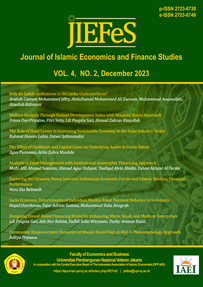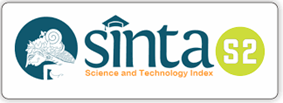Designing Ziswaf-Based Financing Model for Enhancing Micro, Small, and Medium Enterprises
DOI:
https://doi.org/10.47700/jiefes.v4i2.6822Keywords:
Financing, MSMEs, Waqf, ZISAbstract
Micro, Small, and Medium Enterprises (MSMEs) are important in advancing the economy. However, among some existing MSME actors, many of them face obstacles in developing their businesses. Some of those obstacles are the lack of competence and expertise, the lack of business networks, and the limited amount of capital. This research aims to design the development of a sharia financing model based on using zakat, infaq, sadaqah, and waqf (ziswaf) funds to develop MSMEs. This research uses qualitative methods by analyzing various data collected from several works of literature related to ziswaf and MSME studies. This research produces a design model for integrated ziswaf management in the MSME development program. This model describes the process flow starting from collecting ziswaf funds, with a distribution process that is adjusted to the characteristics of the funds. ZIS funds are channeled to the procurement of goods and business equipment, as well as to capacity-building programs for MSMEs. The waqf funds are distributed in the form of business capital investment with a mudharabah agreement. The profits received are given to the nazhir according to the agreement, to be managed by the nazhir, and distributed to the mauquf alaih. The entire process is carried out with supervision and monitoring to maintain conformity of procedures with existing rules and regulations. It is hoped that this model can become a new direction for the development of MSMEs by optimizing ziswaf funds in an integrated manner.
Usaha Mikro, Kecil, Menengah (UMKM) merupakan unit ekonomi yang penting dalam memajukan perekonomian. Namun, di antara sejumlah pelaku UMKM yang ada, banyak dari mereka menghadapi kendala dalam pengembangan usahanya. Di antara kendala yang dihadapi antara lain terkait minimnya kompetensi dan keahlian, minimnya jejaring usaha, hingga jumlah modal yang terbatas. Penelitian ini bertujuan untuk mendesain pengembangan model pembiayaan syariah berbasis pemanfaatan dana zakat, infak, sedekah, dan wakaf untuk pengembangan UMKM. Penelitian ini menggunakan metode kualitatif dengan menganalisis berbagai data yang dihimpun dari beberapa literatur terkait kajian ziswaf dan UMKM. Penelitian ini menghasilkan sebuah rancangan model pengelolaan ziswaf terintegrasi pada program pengembangan UMKM. Model tersebut menggambarkan alur proses yang dimulai dari penghimpunan dana ziswaf, dengan proses penyaluran yang disesuaikan dengan karakteristik dana. Dana ZIS disalurkan pada pengadaan barang dan perlengkapan usaha, serta pada program peningkatan kapasitas pelaku UMKM. Adapun dana wakaf disalurkan dalam bentuk investasi modal usaha dengan akad mudharabah. Keuntungan yang diterima diberikan kepada nazhir sesuai dengan kesepakatan, untuk nantinya dikelola oleh nazhir dan disalurkan kepada para mauquf alaih. Keseluruhan proses tersebut dilakukan dengan pengawasan dan monitoring untuk menjaga kesesuaian prosedur dengan aturan dan ketentuan yang ada. Model ini diharapkan dapat menjadi arah baru pengembangan UMKM dengan mengoptimalkan dana ziswaf secara terintegrasi.
References
AK, M. F., & Nasution, A. W. (2019). Boosting The Welfare of Business Community: Implementing The Model of Islamic Micro Bank of Waqf in Pesantren. AL-FALAH : Journal of Islamic Economics, 4(1), 13–26. https://doi.org/10.29240/alfalah.v4i1.771
Andriyani, D., Nailufar, F., & Yurina, Y. (2021). Analyzing the Sustainability of Micro, Small and Medium Enterprises during Covid-19 Pandemic in Bireuen Regency, Indonesia. International Journal of Business, Economics, and Social Development, 2(3), 119–126. https://doi.org/10.46336/ijbesd.v2i3.159
Direktorat Kajian dan Pengembangan ZIS DSKL Nasional. (2023). Outlook Zakat Indonesia 2023. In Pusat Kajian Strategi Baznas (Issue Januari).
Faisal, F. (2021). Increase MSMEs Capital in Covid 19 Pandemic Through Cash Waqf. Proceeding International Seminar of Islamic Studies, 2, 565–570. http://journal.umsu.ac.id/index.php/insis/article/view/6340
Fauziah, N. N., & Kassim, S. (2022). Cash Waqf Model for Social Enterprise to Achieve Sustainable Development Goals in Indonesia. Al-Muzara’ah, 2022(Special Issue), 95–105. https://doi.org/10.29244/jam.specialissue2022.95-105
Hamidah, R. A., Widiastuti, T., Alam, A., & Cahyono, E. F. (2017). Impact of ZIS (Zakah, Infaq and Sadaqa) Distribution and Islamic Financial Institutions to MSMEs (Micro, Small, and Medium Enterprises) and Gross Regional Product Growth in East Java (2011-2014 Periods). Journal of Islamic Financial Studies, 3(1), 1–15. https://doi.org/10.12785/jifs/030101
Harianto, S., Mizan, M., Amin, H. Al, & Halim, A. (2023). Sharia Equity Crowdfunding Model Waqf. International Journal of Educational Review, Law And Social Sciences, 3(1), 293–303.
Haruna, H. T., & Ibrahim, A. S. (2021). The Contribution of Waqf Institution as A Financial Tool in Addressing Poverty Reduction: Evidence from The Literature. AZKA International Journal of Zakat & Social Finance, 2(2), 151–178. https://doi.org/10.51377/azjaf.vol2no2.64
Juzairy, A. Al. (2014). Al-Fiqh ’ala al-Madzahib al-Arba’ah. Daar al-Jauzy.
Maesarach, R. M., Trimulato, & Rodoni, A. (2022). Sukuk Linked Wakaf For MSME Develpoment. BASKARA : Journal of Business and Entrepreneurship, 5(1), 95–107. https://doi.org/10.54268/baskara.5.1.95-107
Mahanani, Y., & Kassim, S. (2021). Developing Integrated Cash Waqf Model in Baitul Mal Wa Tamwil (BMT). In BWI Working Paper Series. https://www.bwi.go.id/wp-content/uploads/2021/10/20211030-08-BWI-Working-Paper-Series-Oktober-2021.pdf
Majid, R. (2022). Mudharabah Linked Waqf : Inovasi Model Pembiayaan Berkelanjutan untuk UMKM. As-Syirkah: Islamic Economics and Financial Journal, 1(1), 22–38.
Mohamed, I., & Abro, L. A. (2021). Using Islamic Social Financial Instruments to Assist the MSMEs in Post COVID-19. GISRAS Journal of Management & Islamic Finance, 1(1), 80–97. http://www.gjmif.com/index.php/GJMIF/article/view/6
Muannasa, A. (2022). Fintech Waqf for MSMEs Empowerment in Indonesia. Li Falah: Jurnal Studi Ekonomi Dan Bisnis …, 7(2), 33–42. https://ejournal.iainkendari.ac.id/index.php/lifalah/article/view/5339%0Ahttps://ejournal.iainkendari.ac.id/index.php/lifalah/article/download/5339/2211
Pusat Kajian Strategis. (2018). Fiqih Zakat Perusahaan. PUSKAS, Badan Amil Zakat Nasional.
Riyadi, A. H., Abdukad, A. A. S., Saif, B. M., Takow, H. A., & Sharofiddin, A. (2021). The Effect of Utilizing Zakat Fund on Financing Production to Achieving Social Welfare: in Indonesia as a Case Study. Journal of Islamic Finance, 10(1), 019–029.
Rizki, M., Sari, N., & Widjayanti, A. (2022). Optimization of Micro Waqf Bank’s Ability to Support Micro and Small Businesses. The 3rd International Conference on Governance, Public Administration, and Social Science (ICoGPASS), 2022(September 2020), 1269–1285. https://doi.org/10.18502/kss.v7i9.11015
Rohim, A. N. (2019). Optimalisasi Penghimpunan Zakat Melalui Digital Fundraising. Al-Balagh : Jurnal Dakwah Dan Komunikasi, 4(1), 59–90. https://doi.org/10.22515/balagh.v4i1.1556
Rohim, A. N., & Ridwan, A. H. (2022). Wakaf dalam Perspektif Al-Qur’an dan Hadis: Esensi dan Signifikansi pada Tataran Ekonomi dan Sosial. Al Quds: Jurnal Studi Alquran Dan Hadis, 6(2), 659–678. https://doi.org/10.29240/alquds.v6i2.3742
Rosana, F. C. (2022). Baznas: Potensi Zakat di Indonesia Capai Rp 327 Triliun. Bisnis Tempo. https://bisnis.tempo.co/read/1578010/baznas-potensi-zakat-di-indonesia-capai-rp-327-triliun
Sanyinna, A. B. Y., Osman, M. F., & Omar, H. H. (2017). Sustainable Poverty Alleviation through Integration of Waqf and Microfinance: A Case Study of Sokoto State, Nigeria. International Journal of Business and Technopreneurship, 7(3), 273–306.
Sanyinna, A. Y., Hashim, H., & Osman, M. F. (2018). Cash Waqf as an Effective Tool of Financing MSMEs for Sustainable Poverty Alleviation: A Nigerian Perspective. International Journal of Islamic Business, 3(1), 70–90. https://doi.org/10.32890/ijib2018.3.1.5
Sasongko, D. (2020). UMKM Bangkit, Ekonomi Indonesia Terungkit. Kementerian Keuangan RI. https://www.djkn.kemenkeu.go.id/artikel/baca/13317/UMKM-Bangkit-Ekonomi-Indonesia-Terungkit.html
Sulaeman, S. (2020). A Conceptual and Empirical Study on the Development of the Islamic Donation-based Crowdfunding Platform Model for Micro Small and Medium-sized Enterprises (MSMEs) in Times of Covid-19 Pandemic in Indonesia. Asian Journal of Islamic Management (AJIM), 2(2), 107–122. https://doi.org/10.20885/ajim.vol2.iss2.art4
Suprayitno, E., Aslam, M., & Harun, A. (2017). Zakat and SDGs : Impact Zakat on Human Development in the Five States of Malaysia. International Journal of Zakat, 2(1), 61–69. https://ijazbaznas.com/index.php/journal/article/download/15/12/
The ASEAN Secretariat. (2022). ASEAN Investment Report 2022 (Issue October).
Waldan, R., Asma, N., & Suhrawardi. (2022). Resilience of Micro, Small and Medium Enterprises (MSMEs) Through Islamic Social Finance (ISF) after the Covid 19 Pandemic. Journal of Multidisciplinary Islamic Studies, 2(1), 20–28. www.majmuah.com
Wardy Putra, T., Saputra, J., Taufiq Possumah, B., & Yofaldy Ichsan Hasyim, M. (2023). Productive Waqf Development Model: A Comparative Study between Indonesia and Malaysia. Tazkia Islamic Finance and Business Review, 17(1), 13–35. https://doi.org/10.30993/tifbr.v17i1.314
Downloads
Published
Issue
Section
License
Copyright (c) 2023 Lili Puspita Sari, Ade Nur Rohim, Fadhli Suko Wiryanto, Dzaky Ammar Fauzi

This work is licensed under a Creative Commons Attribution 4.0 International License.
Authors who publish with this journal agree to the following terms:
- Authors retain copyright and grant the journal right of first publication with the work simultaneously licensed under a Creative Commons Attribution 4.0 International License that allows others to share the work with an acknowledgment of the work's authorship and initial publication in this journal.
- Authors can enter into separate, additional contractual arrangements for the non-exclusive distribution of the journal's published version of the work (e.g., post it to an institutional repository or publish it in a book), with an acknowledgment of its initial publication in this journal.
- Authors are permitted and encouraged to post their work online (e.g., in institutional repositories or on their website) before and during the submission process, as it can lead to productive exchanges, as well as earlier and greater citation of published work.

This work is licensed under a Creative Commons Attribution 4.0 International License.











